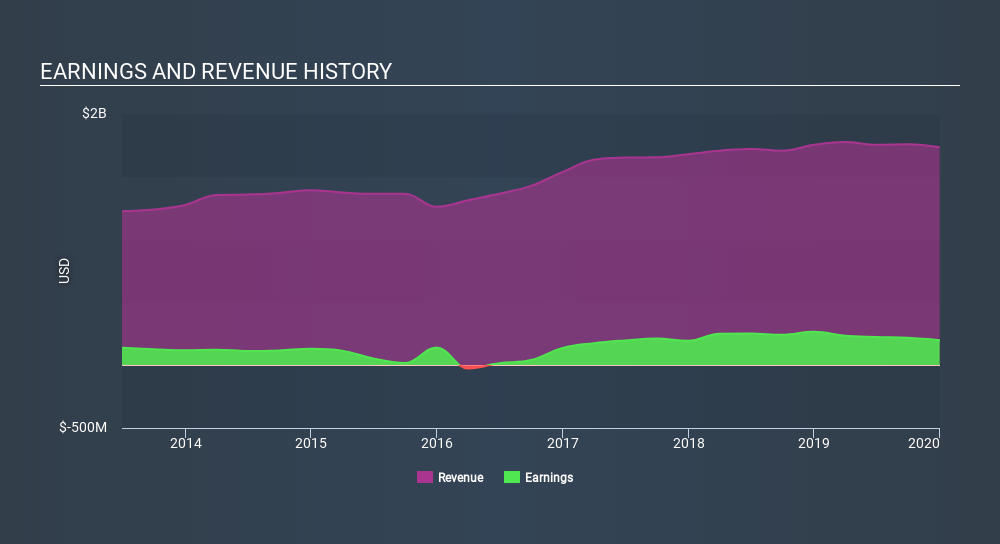Stock Analysis
- United States
- /
- Other Utilities
- /
- NYSE:BKH
Does Black Hills's (NYSE:BKH) Statutory Profit Adequately Reflect Its Underlying Profit?

As a general rule, we think profitable companies are less risky than companies that lose money. That said, the current statutory profit is not always a good guide to a company's underlying profitability. Today we'll focus on whether this year's statutory profits are a good guide to understanding Black Hills (NYSE:BKH).
It's good to see that over the last twelve months Black Hills made a profit of US$199.3m on revenue of US$1.73b. Happily, it has grown both its profit and revenue over the last three years (though we note its profit is down over the last year).
Check out our latest analysis for Black Hills

Of course, it is only sensible to look beyond the statutory profits and question how well those numbers represent the sustainable earnings power of the business. In this article we will consider how Black Hills's decision to issue new shares in the company has impacted returns to shareholders. That might leave you wondering what analysts are forecasting in terms of future profitability. Luckily, you can click here to see an interactive graph depicting future profitability, based on their estimates.
One essential aspect of assessing earnings quality is to look at how much a company is diluting shareholders. Black Hills expanded the number of shares on issue by 11% over the last year. That means its earnings are split among a greater number of shares. Per share metrics like EPS help us understand how much actual shareholders are benefitting from the company's profits, while the net income level gives us a better view of the company's absolute size. You can see a chart of Black Hills's EPS by clicking here.
How Is Dilution Impacting Black Hills's Earnings Per Share? (EPS)
As you can see above, Black Hills has been growing its net income over the last few years, with an annualized gain of 45% over three years. But EPS was only up 24% per year, in the exact same period. Net profit actually dropped by 25% in the last year. But the EPS result was even worth, with the company recording a decline of 33%. So you can see that the dilution has had a bit of an impact on shareholders. Therefore, the dilution is having a noteworthy influence on shareholder returns. And so, you can see quite clearly that dilution is influencing shareholder earnings.
If Black Hills's EPS can grow over time then that drastically improves the chances of the share price moving in the same direction. But on the other hand, we'd be far less excited to learn profit (but not EPS) was improving. For that reason, you could say that EPS is more important that net income in the long run, assuming the goal is to assess whether a company's share price might grow.
Our Take On Black Hills's Profit Performance
Over the last year Black Hills issued new shares and so, there's a noteworthy divergence between EPS and net income growth. Therefore, it seems possible to us that Black Hills's true underlying earnings power is actually less than its statutory profit. But at least holders can take some solace from the 24% per annum growth in EPS for the last three. The goal of this article has been to assess how well we can rely on the statutory earnings to reflect the company's potential, but there is plenty more to consider. In light of this, if you'd like to do more analysis on the company, it's vital to be informed of the risks involved. For instance, we've identified 3 warning signs for Black Hills (1 doesn't sit too well with us) you should be familiar with.
Today we've zoomed in on a single data point to better understand the nature of Black Hills's profit. But there is always more to discover if you are capable of focussing your mind on minutiae. For example, many people consider a high return on equity as an indication of favorable business economics, while others like to 'follow the money' and search out stocks that insiders are buying. While it might take a little research on your behalf, you may find this free collection of companies boasting high return on equity, or this list of stocks that insiders are buying to be useful.
If you spot an error that warrants correction, please contact the editor at editorial-team@simplywallst.com. This article by Simply Wall St is general in nature. It does not constitute a recommendation to buy or sell any stock, and does not take account of your objectives, or your financial situation. Simply Wall St has no position in the stocks mentioned.
We aim to bring you long-term focused research analysis driven by fundamental data. Note that our analysis may not factor in the latest price-sensitive company announcements or qualitative material. Thank you for reading.
About NYSE:BKH
Black Hills
Through its subsidiaries, operates as an electric and natural gas utility company in the United States.
6 star dividend payer and undervalued.

